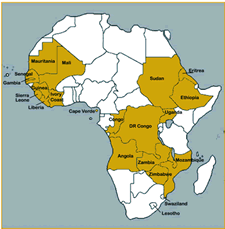|
|
Vol.
25 No. 2
March - April 2003
CHEMRAWN
XII
- World Conference on Chemistry, Sustainable Agriculture,
and Human Well-Being in Sub-Saharan Africa
 |
|
Agricultural
production in Africa has largely remained in the hands
of small-holder farmers.
World
Health Organization/P.Virot
|
by
Ikenna Onyido
The
problems facing the African continent, especially the sub-Saharan
region, are enormous and demand urgent action in order to avert
impending tragedy. With a population of well over half a billion,
which is still growing rapidly, increasing poverty levels, food
insecurity, health and human well-being problems of disturbing
proportions, and crumbling economies, the region presents a
picture of misery that is a blight on modern civilization. Yet
it is a certain fact that the region is well endowed with human
and natural resources, which if properly harnessed and managed,
shall usher in an era of development and prosperity that will
make the region less of a liability to the developed world.
Of
particular concern is the food and agriculture situation in
sub-Saharan Africa, where food production levels are critically
low in relation to the population. It is a well-known fact
that the specter of hunger and famine hangs over the region
in the foreseeable future if drastic ameliorating actions
and initiatives are not undertaken. Agricultural production
has largely remained in the hands of peasant small-holder
farmers, who use traditional slash-and-burn, low-yielding
modes of production, with outputs that at best satisfy subsistence
levels. In some cases, modern agricultural methods have been
introduced by multilateral, donor and non-governmental agencies.
However, short-term gains that are recorded often evaporate
at the end of the intervention period because appropriate
technologies have not been transferred to or understood by
the local populations. The combined effects of traditional
modes of production and ill-transferred technologies are manifested
in continuing low productivity and environmental degradation.
Thus, the cycle of poverty and hunger continues.
Chemistry,
Sustainable Agriculture, and Human Well-Being
 |
|
Africa’s
Hunger Crisis: at least 38 million people in the countries
highlighted above are suffering exceptional food shortages.
(Larger
Image)
Source: UN World Food Programme
|
In
light of the scenario described above, the CHEMRAWN Committee
believes that an effort should be undertaken to transfer proven
chemical and soil management technologies to Africans. The
idea is to impart to African people the knowledge and dynamic
approaches that will help them anticipate problems and evolve
timely solutions for creating sustainable agriculture, thereby
raising the standard of living, especially of the rural majority.
Consequently, the committee has approved CHEMRAWN XII, a Conference
on Chemistry, Sustainable Agriculture, and Human Well-Being.
The conference is intended to motivate sustained action so
that over time, indigenous capacity can be built among the
African people to ensure food self-sufficiency and food security
in the long run.
CHEMRAWN
II, a forerunner to this conference held in 1982, addressed
the issue of "Chemistry and World Food Supplies: The New Frontiers."
CHEMRAWN XII shall integrate recent advances in increasing
food production with careful and responsible care of the environment,
especially as applied to Africa.
Overview
of the CHEMRAWN XII Conference
Planned
for 2005, the conference will focus on the following:
- creating
awareness among African governments, the private sector
and various stakeholders about the magnitude of the problem
and the technological options available for enhancing food
security and protecting the natural base in the region
- the
transfer, adaptation, and application of the stock of available
and affordable chemical knowledge and technology for addressing
the problems of agricultural production and environmental
management, especially in the areas of soil fertility, pest
management, post-harvest storage and processing, and biotechnology
- the
installation of pilot development and research projects
in the different sub-regions to provide for collaboration
between scientists drawn from Africa and other parts of
the world through the activities of the conference’s
Future Actions Committee
Distinguished
scientists and professionals from Africa and beyond who have
contributed to the development of sustainable agriculture
and responsible natural resource management will present plenary
and invited papers. Scheduled lecturers include Thomas Odhiambo
(Kenya), Francis Idachaba (ISNAR, The Hague), Avilio Franco
(Brazil), Rattan Lal (USA), Christopher Chetsanga (Zimbabwe),
and Patrick Ngoddy (Nigeria).
A
decision shall soon be made about whether South Africa or
Senegal will be the conference venue. The First Circular shall
then be distributed with all the necessary details.
Call
for Papers and Appeal for Support
In
order to plan effectively for the conference, we are asking
scientists and professionals to become involved early enough
to be ready to contribute papers for oral and poster presentation.
We would also like to appeal to stakeholders and donor agencies
for financial support to tackle this pressing issue. A number
of international organizations have already given their endorsement
for the proposed conference. Stakeholders, donor agencies,
and scientists who would like to be part of this timely and
worthwhile effort are invited to contact the chairman of the
Conference Steering Committee at the following address:
Professor
Ikenna Onyido
Director, Centre for Agrochemical Technology
University of Agriculture
P.M.B. 2373, Makurdi, Nigeria
E-mail: [email protected]
www.iupac.org/projects/2001/2001-086-1-021.html
atory
Medicine
Page
last modified 6 March 2003.
Copyright © 2002-2003 International Union of Pure and
Applied Chemistry.
Questions regarding the website, please contact [email protected]
|